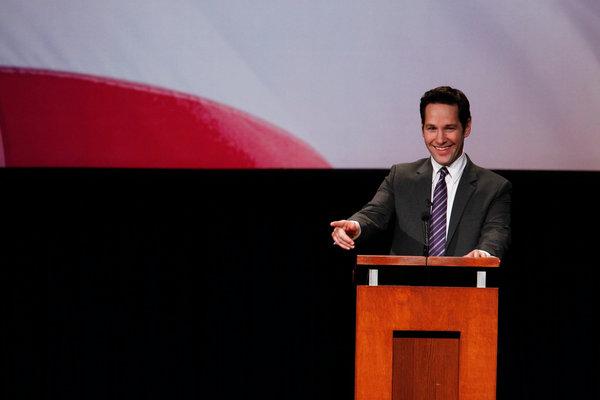In season four of NBC’s “Parks and Recreation,” Paul Rudd plays a wealthy businessman named Bobby Newport who runs for city council because he’s looking for something “easy” to do. He is asked during a debate how he’d fix the town. His answer: “I have no idea.” Still, the audience goes wild, much to the frustration of his rival, Leslie Knope.
It’s funny because it’s relatable. Sooner or later, we all may encounter a Bobby Newport. What is it about an elite upbringing that seems to make people feel qualified for tasks where they have little experience? This is one of the questions that inspired a study published Monday in The Journal of Personality and Social Psychology.
The researchers suggest that part of the answer involves what they call “overconfidence.” In several experiments, they found that people who came from a higher social class were more likely to have an inflated sense of their skills — even when tests proved that they were average. This unmerited overconfidence, they found, was interpreted by strangers as competence.
The findings highlight yet another way that family wealth and parents’ education — two of a number of factors used to assess social class in the study — affect a person’s experience as they move through the world.
“With this research, we now have reason to think that coming from a higher social class confers yet another advantage,” said Jessica A. Kennedy, a professor of management at Vanderbilt University, who was not involved in the study.
Studying social class is tricky. First there’s the matter of definitions. “Most people would say they are middle class,” said Peter Belmi, a professor at the University of Virginia’s Darden School of Business and a lead author of the study. But how can that be?
Even researchers who specialize in social class struggle to agree on the weight to give income, family wealth, professional prestige and other factors.

Paul Rudd as Bobby Newport, the genial but dimwitted politician on NBC’s “Parks and Recreation.”CreditNBC via Getty Images
Previous work has found that many people can correctly gauge a stranger’s family income bracket and mother’s education level within 60 seconds. But what exactly they are responding to is not well understood, said Rebecca Carey, who studies social class and identity at Northwestern University’s Kellogg School of Management.
The study consisted of four experiments. Class was defined multiple ways each time.
The first experiment involved about 150,000 small-business owners in Mexico applying for a loan. In addition to providing their income and education level, they were asked to select a rung on a ladder, representing their place relative to others in Mexico.
As part of the loan process, they took a memory test. (The real-life task was designed to try to predict whether a person would default on a loan.) For the purposes of the study, participants were also asked to estimate how well they thought they did compared with others. Higher-class people generally performed better than others — but not to the degree they assumed they did, researchers found.
The disparity between upper-class people’s estimated performance and actual performance was more dramatic in a later study involving 230 University of Virginia students.
This time, social class was measured by students’ assessment of how they saw themselves relative to others in the United States, their parents’ income and their parents’ education. Researchers found that students of higher social classes failed to outperform their peers in a trivia exercise. But once again, most were certain they had.
In an attempt to understand the implications of overconfidence, the researchers constructed a mock job interview. The students were asked the same question and videotaped. A group of strangers then watched the videos and rated the candidates. The selection committee generally opted for the same people who’d overestimated their trivia abilities. Overconfidence was misinterpreted as competence.
Ms. Carey was unconvinced by how much the faux-job interview experiment demonstrated about real life. She also had some concerns about the findings from the first of the four experiments, which she believed relied too heavily on the participants’ own sense of social class standing.
“But what they do very consistently show is that social class is tied to overconfidence,” she said. Other studies have also shown that people who are overconfident are perceived as more competent. Ms. Carey suggested that it could be that “in a lower-class context, the cost is higher if you are wrong when you make a mistake.”
And not all class groups value “faking it until you make it,” Dr. Belmi said. “I grew up in the Philippines with the idea that if you have nothing to say, just shut up and listen.”
Researchers said they hoped that the takeaway was not to strive to be overconfident. Wars, stock market crashes and many other crises can be blamed on overconfidence, they said. So how do managers, employers, voters and customers avoid overvaluing social class and being duped by incompetent wealthy people? Dr. Kennedy said she had been encouraged to find that if you show people actual facts about a person, the elevated status that comes with overconfidence often fades away.
“We may also need to punish overconfident behavior more than we do,” she said.

